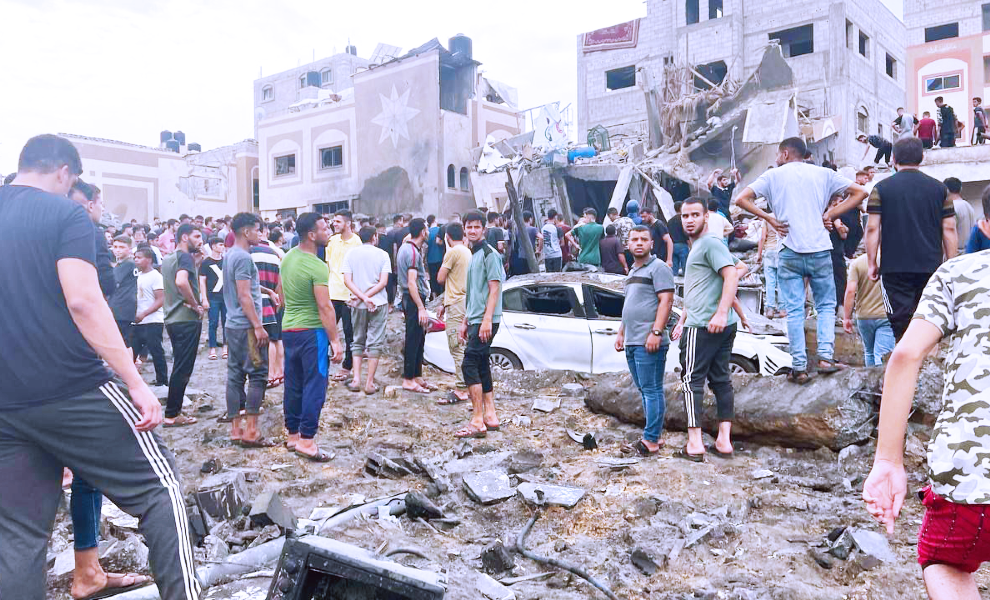My eyes adjust to the letters on my phone. An attack. It’s the biggest one in a long time. Perhaps the biggest ever.
I am two things. Astonished at how Hamas managed to pull this off and devastated at the thought of the collective punishment to come.
It only takes a few hours for the first bomb to drop.
***
“We are safe. God is our protector. But the situation is really difficult.”
My cousin messages me hours into this new war, from his home in Gaza to mine in London.
We were both born in 1991, on the cusp of the Oslo Accords. We spent our first years under the same roof in Ramallah. Our fathers had moved in with our grandparents, creating a multi-generational household. We lived like siblings, with our grandmother as our all-knowing matriarch, until my uncle moved his family back to Gaza, and my father found us an apartment in Ramallah. We grew up to the steady soundtrack of our grandmother’s memories and our origin story: her forcible displacement from a small town called Isdud in 1948.
We learned about their house, the sea, the vegetables she grew, their neighbors, my grandfather’s bicycle.
She taught us that what was taken from her was more than material.
It was a life; communal, whole and full, deliberate in its harmony with nature, abundant because nobody asked more than they needed, innocent in the assumption that it would last forever.
This memory of a life that was and might still be is what is contained in a word that Palestinians across the world carry close to our hearts and ready on our tongues. The name of our indigenous hometown.
In my family’s case, this word is Isdud.
What is your word? Are you my lost neighbor from al-Majdal? Deir al-Dubban? al-Faluja?
My grandmother fled Isdud on foot, with two children by her side and seven months pregnant. She ended up in Khan Younis refugee camp in Gaza. Like 70 percent of Gaza’s inhabitants, she is a refugee from towns within walking distance yet unreachable.
Despite her yearning for Isdud, our grandmother made Khan Younis her home and loved Gaza dearly. Palestinians love Gaza dearly.
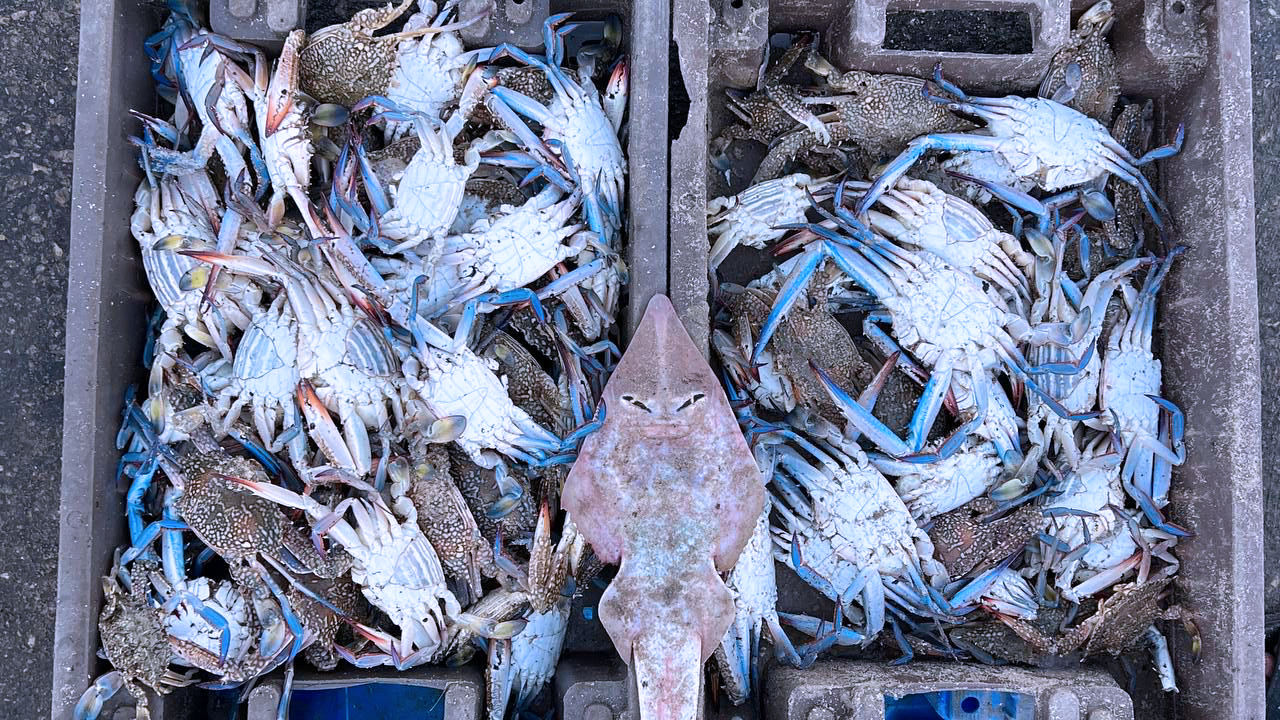
It grows the best strawberries; its fish need nothing but a squeeze of lemon; our toes nestle happily in the soft sand of its beaches. Its people are so much more than the passive victims or mindless fanatics that outsiders like to imagine.
***
The slow death of our social fabric under decades of occupation and siege is nothing compared to the sudden devastation of war.
Yet we know that our annihilation started far before Gaza came to bear the brunt of the death and suffering that the world has placed squarely on Palestinian backs.
Every Palestinian who is alive today is nothing shy of a miracle. You, I am talking about you. You are a miracle.
Your grandparents withstood annihilation for long enough to bear your parents, and they, too, withstood long enough to bear you. Perhaps you are younger than me, in which case we can add your great-grandparents to this improbable line of survival.
Your body, your mind, your existence are sacred.
***
When armed Palestinians broke through the siege of Gaza, the lands they entered once belonged to their grandparents – to our grandparents.
For the first time since 1948, Palestinians commanded the roads of Isdud and neighboring towns. That word: Isdud.
I felt no elation, knowing that this wouldn’t last, that we would pay a high price.
As a community, we are crippled in our ability to reflect on Hamas’s attacks.
Frothing outsiders would love to condemn us for supporting Hamas as much as they would love to laud us for condemning our own. Yet another way in which we are trapped.
Not to mention, we are too busy counting our dead.
***
Two days ago, Israel ordered a complete siege on Gaza, tightening its already suffocating restrictions to allow for “no electricity, no food, no fuel,” adding, “we are fighting human animals, and we are acting accordingly.” It was the tip of the iceberg in the dehumanizing language that now flows.
Remember: you are a miracle, and your existence is sacred.
I learn that a family member has died. A great-aunt I never met or knew, so the loss is hardly mine, yet it is ours – us as a people. Her name was Aisha.
She was older than the State of Israel.
When the war began, she was in hospital. She chose to go home to make space for the growing number of war casualties requiring hospital beds.
She died at home. The stress and dehydration were too much for her body to handle.
A woman who survived the Nakba, the occupation, the siege, and everything in between died to the sounds of bombardment, of screams, of annihilation.
I think of that word: Isdud.
***
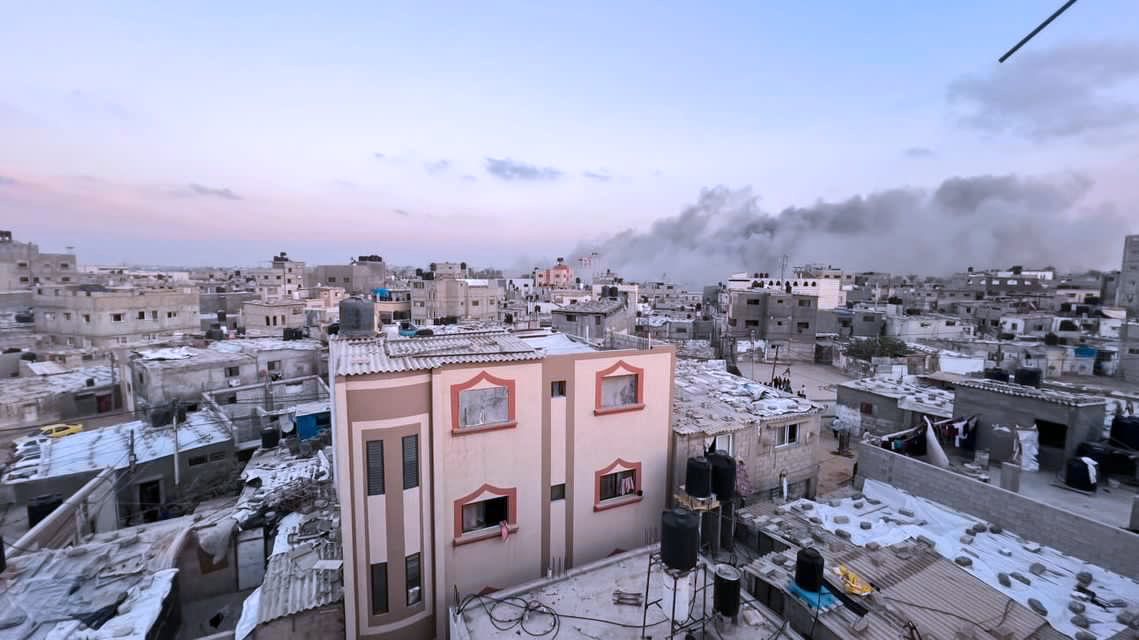
I notice a green dot beside my cousin’s profile on Instagram. I ask how he is.
“We haven’t died yet, but things are really difficult.
This is a war of extermination and cleansing.
What is happening is beyond what I could have ever imagined. Not a single hour passes without a bomb falling.
Terrifying sounds that we haven’t heard before.
I’m struggling to explain it to you or even document it in a way that does it justice.
It’s absolutely insane.
Three nights of bombardments.
We hear the sounds of every bomb as it drops and explodes.
An unbelievable number of martyrs.
Nobody will believe the stories of those who survive; that’s how bad things are.
This is the view from my window right now. And this was the view last night during the bombardments.”
He sends me a short video. I hear explosions fewer than 10 seconds apart and see clouds of thick black smoke around nearby buildings.
He also sends a picture, blurry because it was taken at night. The air is lit with orange and red.
“It’s insane, Samar, what’s happening is literal insanity.
It’s so hard to document accurately.
They’re exterminating unarmed civilians.
Children, women.
An entire neighborhood nearby was eviscerated.
Homes destroyed.
We don’t know when the next bomb will fall; we just hear it when it comes.”
My fingers hover over my keyboard. What can I say? That I’m sorry? That it’s terrible? That I’m thinking of him? Pathetic words of sympathy have no place in his eyewitness testimony.
This is where I tell him I want to share his words. It's feeble, but it’s the only thing I can think of.
“Also, can you arrange for some warplanes to be sent to Gaza? 😂
It’s almost comical—a nuclear power besieging 365 square kilometers.
There isn’t even military honor in this war.”
He’s right. Even in the realm of military history, where wars are often romanticized and killing in the name of nation-states is glorified, this war is about as dishonorable as it gets.
“My friend was killed in his own home.
He was killed together with his brother.
Can anyone explain why?
He was on the phone with me when he was killed.
Can you imagine what I’ve been through?
Goddamn every person who caused this.
We won’t forgive any of those who allowed this to happen.
Many people are complicit.
I lost my oldest friend.
I lost the most important person in my life.”
I finally type my pathetic words: I am sorry. I can’t imagine how that must have been. May he rest in peace.
My cousin ignores this, and rightly so.
“Let them know that we are human beings deserving of life.
God didn’t create us to live this life of war and darkness.
We deserve to live in safety and freedom and tranquillity.”
He suggests that, after the war, perhaps he can connect me to some of his friends so that I can help document their testimonies, too.
I think of how, more than two decades after the intifada, I am only now finding the words to describe the experiences of the unimaginable violence of my childhood. It will take decades for us to understand the true individual and collective consequences of what unfolds today.
How long did it take you to find your words? Or are you still searching?
I think of that word: Isdud.
***
My cousin is online again. I ask how he is, how his parents are, his siblings.
“Once this war ends, I’m leaving Gaza.
I’m exhausted, shattered.
Bombardments are still happening.
The contours of Gaza are being changed as we speak. Annihilated and forever changed.”
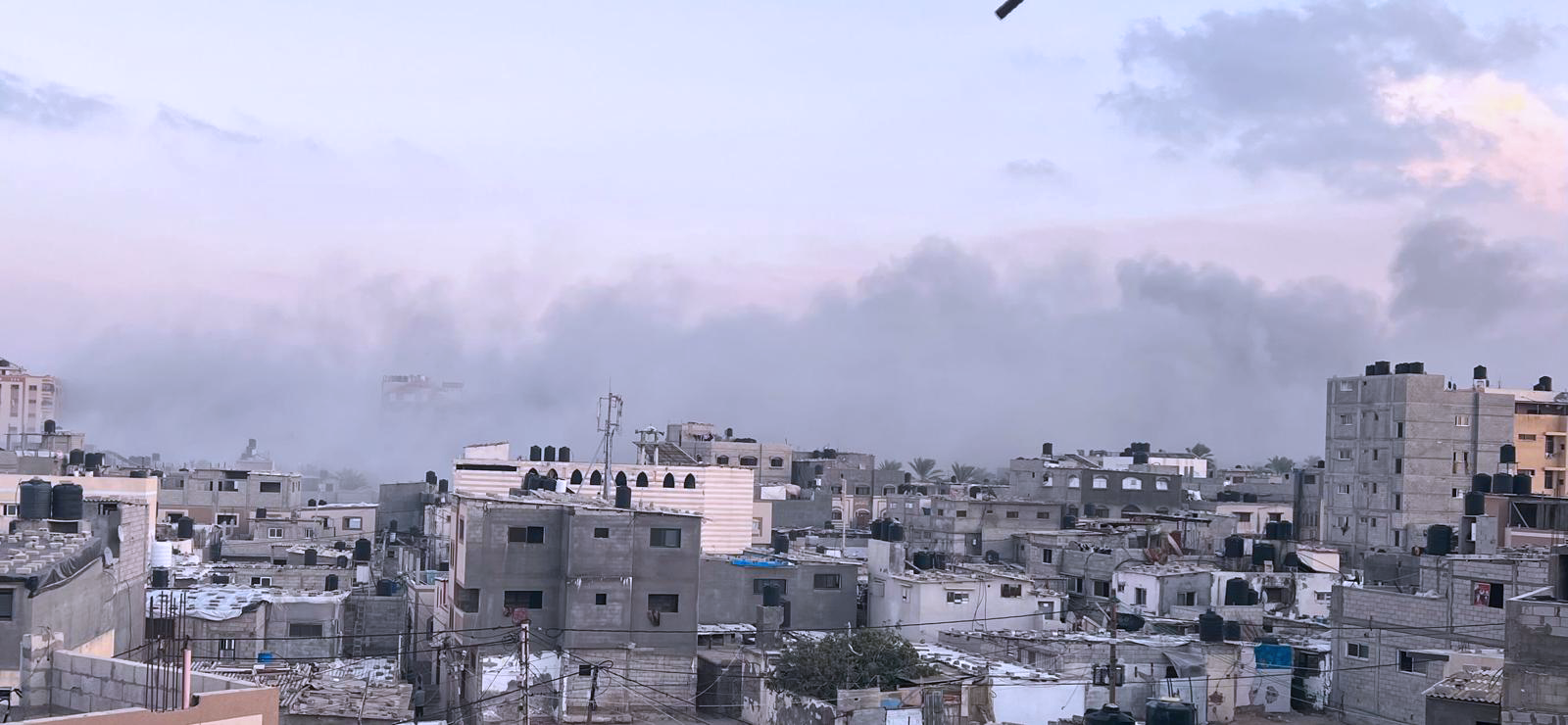
The last time I was in Gaza was in 1999, just before the intifada. I remember it as a quiet place, not as busy as Ramallah often felt. When we drove to the sea near Khan Younis so that I could dip my feet in, nobody else was there.
“Gaza has changed a lot since you were last here. There’s so much life here now. And every time it would get bombed, it would return better and more beautiful.
Unfortunately, this war has wiped everything out.
The neighborhoods they are bombing right now are some of the most beautiful and tranquil areas in Gaza.
Tomorrow, they will be gone completely. Everything is going to change.
I wish I could say more about the political consequences of this war. I have thoughts, but one has to be careful for many reasons. I wish I could say more.”
***
I wake up to the news that Israel has ordered more than one million Palestinians to “evacuate” the north of Gaza, my cousin’s household included.
On the small rectangle of my phone, I watch dystopic scenes of people fleeing their homes en masse. The Nakba is live-streamed.
I think of my grandmother. She is buried in the shadow of a hilltop settlement, away from her indigenous hometown, her colonizers watching over her even in death. I cannot breathe at the thought of her and that word: Isdud.
I walk through my neighborhood without aim, hoping to digest this paralyzing anger, but to no avail. I realize that it isn’t anger that I feel today. It’s pure, inconsolable heartbreak.
Over the past few days, Dutch-language news outlets have contacted me for comment. I ask journalists what their angle is before, inevitably, declining.
Some journalists tell me the angle is how Palestinians feel about Hamas as if that is measurable or relevant.
Others tell me the angle is to understand the context of this tragic situation as if we don’t already possess decades of such knowledge.
A respected investigative journalist tells me that she is exploring whether Israel has gone too far and whether there should be limits to its actions as if laws of war have yet to be invented.
***
It’s been three days since I’ve heard from my cousin or any family member in Gaza.
Some of my foreign friends have said that, surely, no news is good news. I don’t think that law applies in Gaza.
My foreign friends have been kind to me – as kind as they can be. But I notice they quickly move on to other things after asking me about “back home,” as if Palestine doesn’t live in every cell of my being, as if my soul isn’t in pieces and will possibly never recover. The first few days, I tried my best to engage. To be a good friend. But now I have to disengage. I have to stare at these pieces of my soul, to look into the abyss and let it consume me.
So far, I have found solace only in intimate conversations with fellow Palestinians, where we can talk about our thoughts and feelings without violation.
My uncle in Ramallah messages me. He’s spoken to our family in Gaza. They’re alive. Most have gone south. One of my uncles lost his home. It was flattened just after his family left.
***
My father, who normally lives in Ramallah, was abroad when war was declared, and Israel closed its border crossing with Jordan. Today he received word that the border opens for a few hours every now and again. He immediately boarded a plane to Jordan and made his way to the border crossing.
“I will take my chances and wait until they open. I need to be in Palestine.”
This need is layered, I know. He needs to be there for his patients. He needs to be there for his family. He needs to be there for his people. And he needs to be there for himself.
Yesterday, I asked him whether he had heard from our family in Gaza, and he responded with a thumbs-up emoji. He has always been a man of few words. I think many men of his generation are.
My father is lucky and makes it into Palestine within a day, traveling straight from the border to the hospital to catch up on appointments.
That evening, I ask him how he is.
“Fine, work and watching TV!”
He says this as if he hasn’t just returned to a city under its own kind of siege, its outskirts alight with the fire of demonstrations and armed settlers roaming the surrounding roads.
***
I cried today for the first time since the war began.
It wasn’t because of the bombing of the hospital that happened last night, the scenes of bodies and blood and body parts scattered in what was meant to be a safe place.
It wasn’t because of footage of dozens of people gathered around a public tap, filling empty canisters and bottles with water.
It was at the sight of a young boy, perhaps eight years old, holding up his still-empty bottle and looking into the camera.
The boy nudges his friend. Look, he’s filming us, he says.
He smiles and gives the camera a thumbs-up and, with that, cracks my frozen heart wide open.
I wonder, what was it for you?
***
My cousin sends me a message for the first time in a week.
“Hello Samar.
We are alive until now.
We left our house and went to Deir al-Balah.”
I learn that my cousin and his family left their home in Gaza City and walked around 10 kilometers south before being able to catch a taxi to Deir al-Balah, just south of the evacuation line, where they are currently staying with another family member.
“How are you doing? Update me.”
He asks me this with complete sincerity, as if I have anything as important to say. I answer him briefly before asking whether there are bombardments in Deir al-Balah.
“Yes, but only lightly.
I am still breathing, and my parents are okay; that’s all that matters.”
I ask about something that has been on my mind: the house they were forced to leave.
“Honestly, we don’t know much as of now, but we’re assuming it’s still there.”
He sends me a few pictures. Some quickly taken on their way south. Others of an empty beach that looks like it’s never seen war.
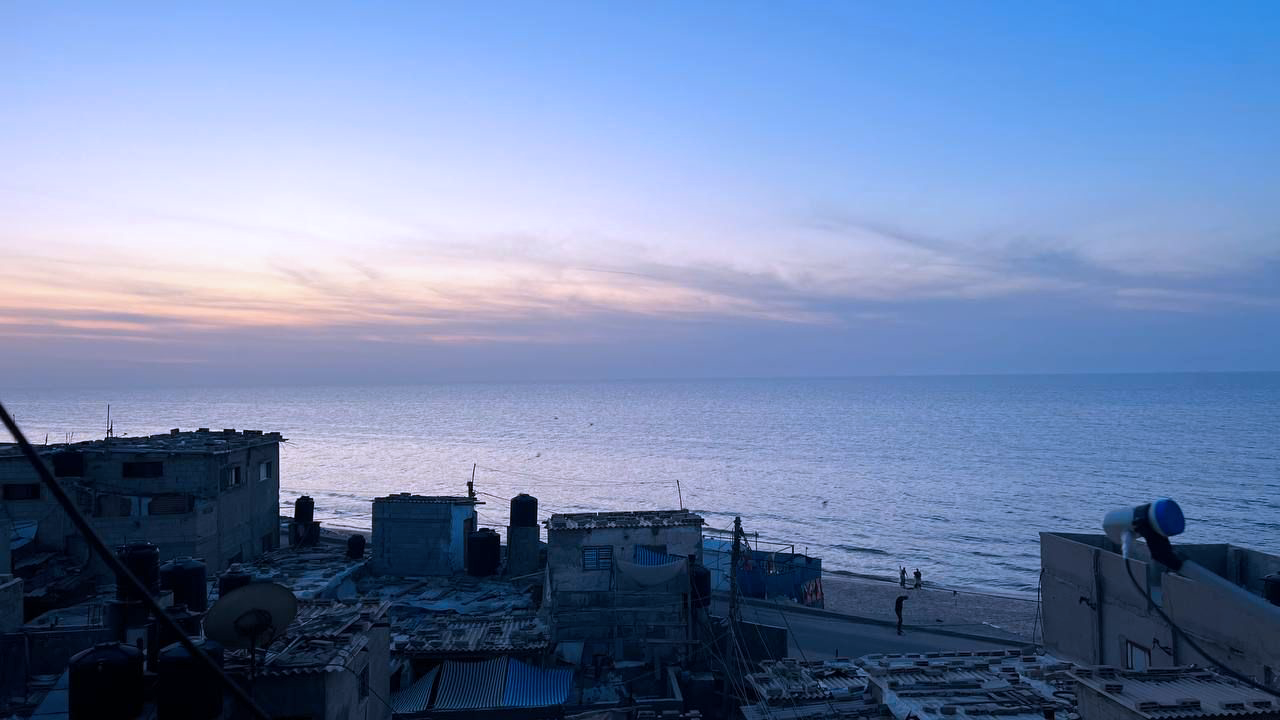
I ask him how he spends his days.
“There’s no electricity, internet, water. None of the basics.
I do nothing. I listen to the radio when I can. Sit on the doorstep to get news from passers-by until sunset. At midnight, I go upstairs and lay down my head and sleep.”
***
“They hit three houses in our street last night. One of them was exactly beside the one we’re staying in. Forty people died.”
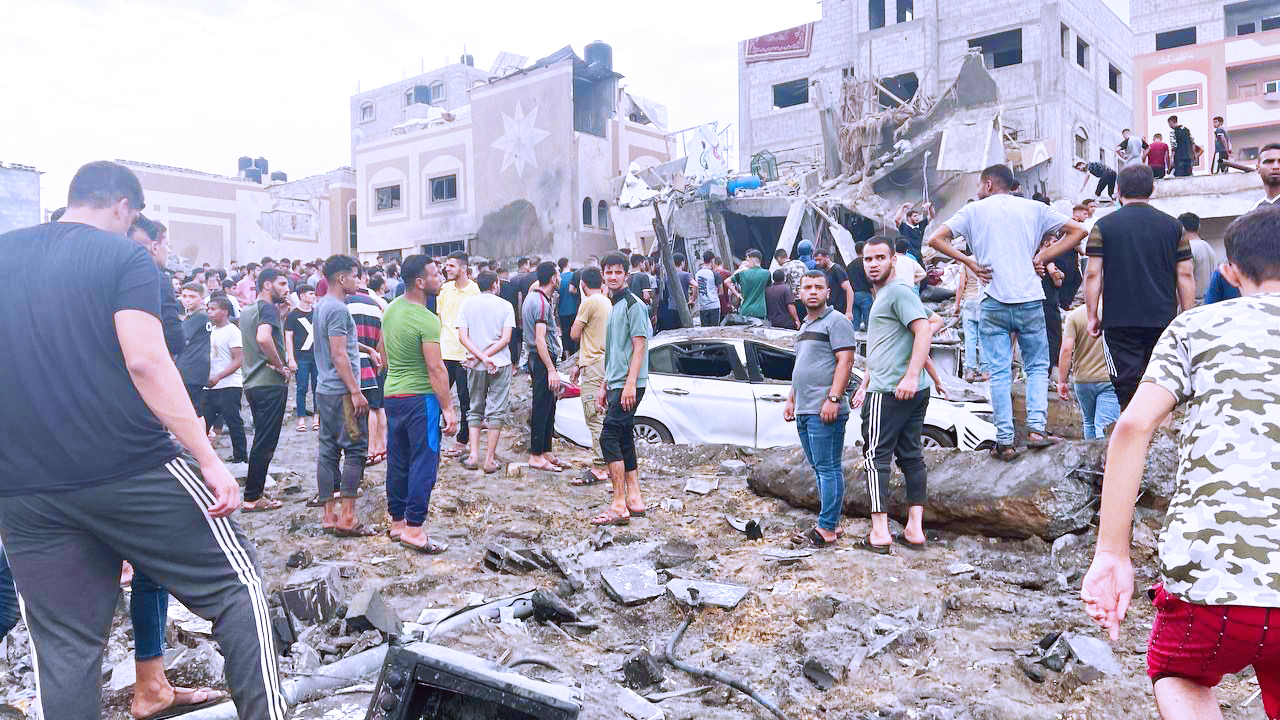
The message pops up on my phone as I walk aimlessly in an increasingly alien city. He tells me that there is no electricity or internet. That he walked somewhere to find a charging point. That he ended up at a supermarket with solar panels and, therefore some electricity to spare.
He sends me a picture of this makeshift charging point. Another picture of a piece of shrapnel that hit him in the night. Another of sacks of onions and potatoes, waiting to be cooked at the supermarket because people can’t cook in their own homes. That is, if they still have homes.
Opposite the supermarket is a bakery that suddenly opens. People rush to it to buy bread.
“But no line is longer than that of the iPhone chargers!”
He tells me that he is also charging a power bank so he can stay in touch. This feels significant; in between the lines, I read that even more than in the first days of this war, his and my family’s lives hang by a thread.
“I do not exaggerate when I say that there is no safe place.”
I know my family is alive, but my cousin hasn’t said much about his friends. I ask.
“They die one after the other.
Yesterday 16.”
My fingers hover over my phone. An incoming message from a friend: thinks about me, hopes my family is okay. I return to the chat with my cousin, feeling feeble words making their way from my fingertips onto the screen again. It’s almost better to say nothing. Almost. I tell him I can’t imagine. May they rest in peace. Again, he ignores my words, rightly so.
“They were innocent. They weren’t part of anything. I try to distract myself from thinking about it.
But how am I going to live here after the war?
What am I going to do? Everybody is gone.
Yesterday my dad told me to find a bride after the war. To keep the bloodline going.”
He is typing something else, then he stops. Ten minutes go by.
“They just bombed right here, where I am.”
Right behind the supermarket.
The explosion was unbelievable.”
There they come again, feeble words. I’m fighting them. He saves me from having to say them just yet. He tells me that he’s not sure what they hit. People are running in the street. But the people at the bakery haven’t moved. Nor have those by the iPhone chargers.
“Fun fact about Gazans, and it’s both a good and a bad thing:
We can adapt to anything.”
People in Gaza hardly have a choice.
He sends me a picture of a United Nations vehicle carrying a pile of flimsy mattresses, clearly second-hand.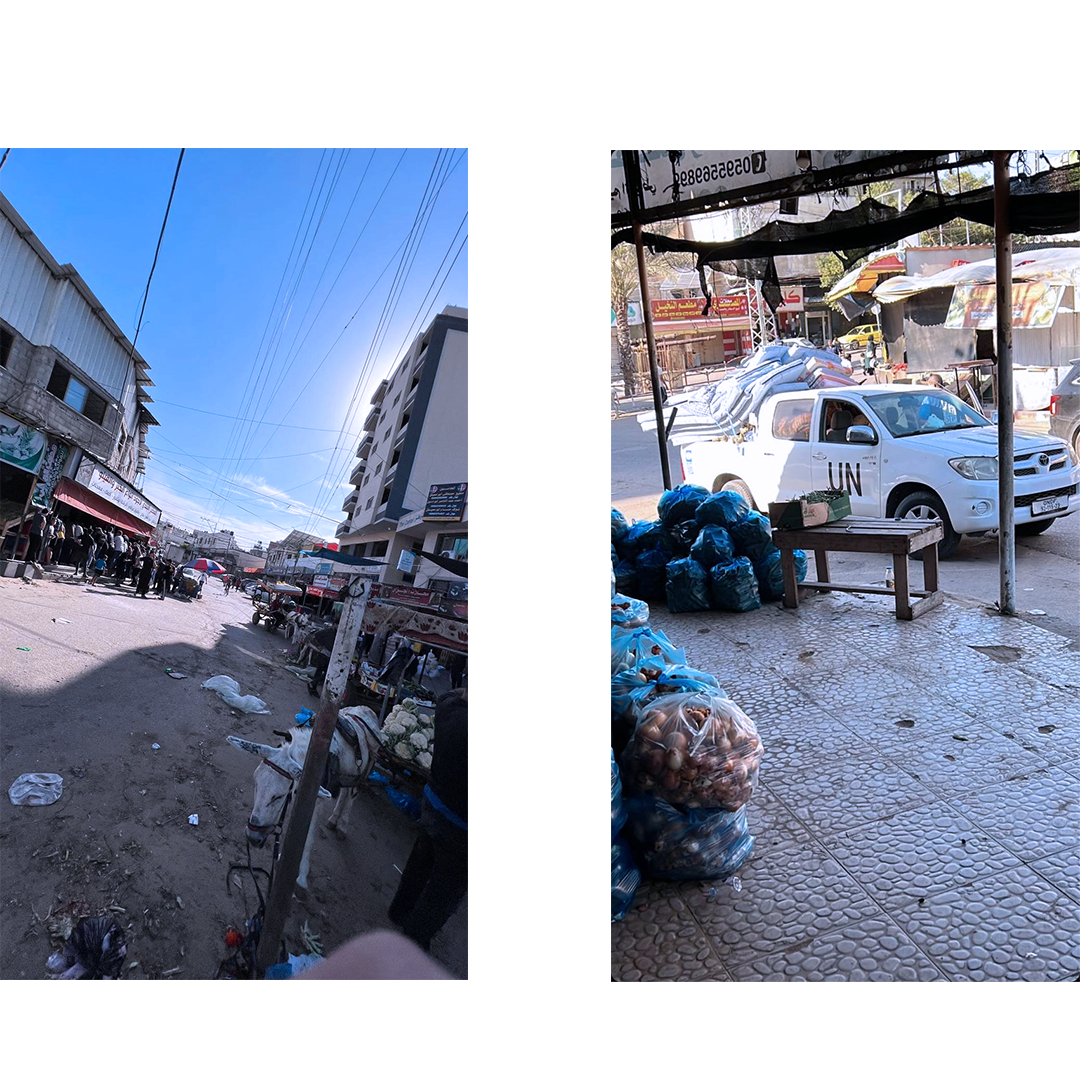 “Look at this joke.”
“Look at this joke.”
Mattresses and onions, that’s all the international community has to offer?
Except the onions were already in Gaza.
Come to think of it, so were the mattresses.
My cousin shifts the conversation. He asks me if I saw the bombing of the church.
“Three of my friends were killed there. I just found out after asking around.
They found their body parts scattered in the rubble. What remained of all three of them fit into one plastic bag.
There has never been a war like this one. It’s completely limitless in its aims. They aren’t even warning people anymore like they used to.
All of these injured and dead, and no space in the hospitals.
The morgues and freezers are full.”
He brings up our grandparents, happy memories of the time spent together in their home when we were young. He tells me how fascinated he was by my mother, this foreign aunt of his. I tell him that his mother taught mine how to cook rice. He tells me that he remembers my strange speech and attempts at a native language I was yet to learn. I tell him that I learned Arabic by doing two things. Playing with him and his sister in the garden. And sitting by our grandmother’s side as she baked bread the same way she had for half a century.
I think of that word: Isdud.
“It’s starting to get dark, so I have to go. I’ve been standing in the street all this time. Take care, and I’ll get in touch as soon as I can.”
I hope we speak again soon.
I hope we see each other again someday.
And I hope that, somewhere in our lifetime, we will sit together on the red-brown earth of our ancestral Isdud, with a distant sea breeze running through our hair, retelling Teta’s stories over a cup of mint tea.
Until then, I will carry not one but two words close to my heart and ready on my tongue, containing our history, our people’s steadfastness, our furious screams, and our rebellious hope.
The first has always been Isdud.
The second is Gaza.



